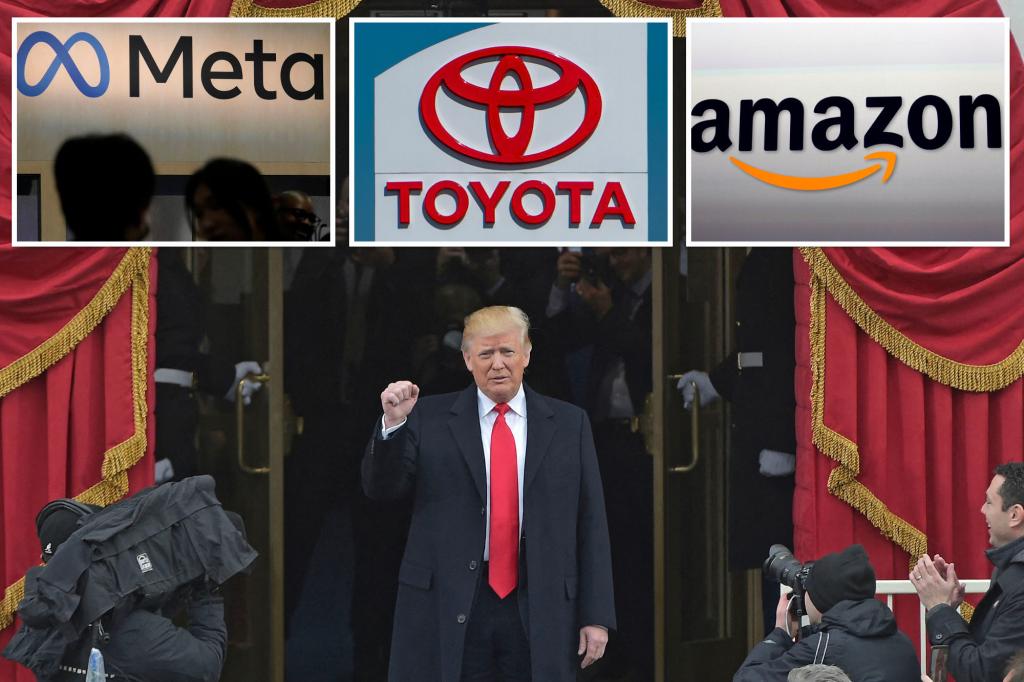The dawn of Donald Trump’s second presidency has been heralded by an unprecedented influx of financial support from corporate giants, both domestic and international. This surge in donations to his inaugural fund, amounting to millions of dollars, marks a stark contrast to the resistance he encountered during his first term. The rush to contribute signifies a strategic realignment within the business world, with companies eager to secure a favorable position within the incoming administration’s policy landscape. Notable contributors include automotive manufacturers like Toyota, Ford, and General Motors, each pledging $1 million, despite previous trade tensions and threats of tariffs imposed by Trump on foreign-made vehicles. This pragmatic approach underscores the corporate world’s recognition of Trump’s influence and their desire to mitigate potential risks to their business interests.
Beyond the automotive sector, the wave of donations extends to various industries, encompassing tech giants, financial institutions, and pharmaceutical companies. Uber leads the pack with a $2 million contribution, while Amazon founder Jeff Bezos, Meta’s Mark Zuckerberg, and OpenAI CEO Sam Altman each donated $1 million. This financial backing from tech leaders signifies a thawing in the previously frosty relationship between Silicon Valley and the former president. Trump’s expressed interest in fostering technological innovation, coupled with the involvement of figures like Elon Musk, has seemingly persuaded tech CEOs to engage with the new administration. This shift in attitude is highlighted by Bezos’s newfound optimism about Trump’s second term, expressing a willingness to collaborate on deregulation efforts.
The reversal of fortune also includes companies that had previously distanced themselves from Trump following the events of January 6th. Intuit, Pharmaceutical Research and Manufacturers of America, Goldman Sachs, Bank of America, AT&T, and Stanley Black & Decker are among those now contributing substantial sums to the inaugural fund. This volte-face demonstrates the prevailing pragmatism within the business world, prioritizing access and influence over past political disagreements. Trump himself has acknowledged this shift, noting the contrast between the opposition he faced in his first term and the eagerness of companies to align themselves with him now.
The allure of Trump’s pro-business rhetoric, particularly his focus on deregulation and expedited approvals for large investments, has proven irresistible to many. Foreign companies are also joining the ranks of contributors, with SoftBank, a Japanese investment holding company, announcing a staggering $100 billion investment in US tech projects under Trump’s administration. This significant commitment reflects the global business community’s interest in capitalizing on potential opportunities arising from the new administration’s policies. Trump’s promise of “fully expedited approvals and permits” for billion-dollar investments serves as a powerful incentive for companies seeking to streamline their operations within the United States.
The influx of donations can also be interpreted as a calculated move by corporations to safeguard their interests against potential policy changes. Trump’s previous pronouncements on trade and tariffs have created an environment of uncertainty, prompting companies to engage with his administration to navigate potential challenges. The contributions to the inaugural fund can be viewed as a form of insurance, aimed at ensuring access and influence within the corridors of power. This strategic approach allows businesses to advocate for their interests directly, minimizing potential disruptions caused by policy shifts.
In essence, the early Christmas present for Trump, in the form of substantial donations from corporate America and international businesses, reflects a pragmatic adaptation to the changing political landscape. Companies are recognizing the importance of engaging with the new administration, regardless of past political differences, to advance their business objectives. The promise of deregulation, expedited approvals, and access to key decision-makers has created a powerful incentive for businesses to contribute to the inaugural fund, securing their place at the table as the new administration takes shape. This dynamic underscores the interplay between business and politics, where financial contributions often serve as a conduit for influence and access, shaping the policy landscape in ways that benefit both the contributing parties and the administration in power.

